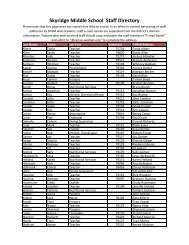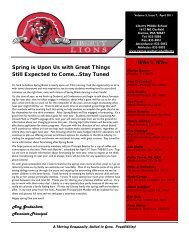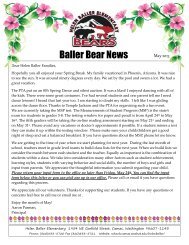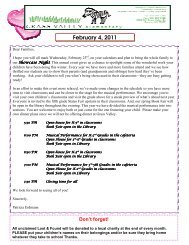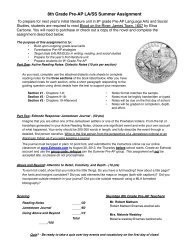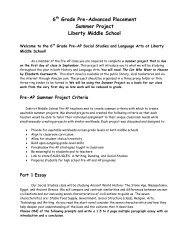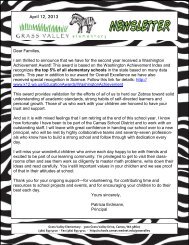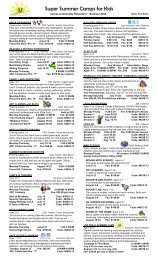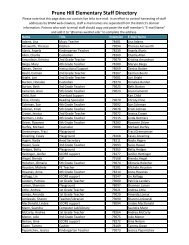Helen Baller Newsletter, February 2013 - Camas School District
Helen Baller Newsletter, February 2013 - Camas School District
Helen Baller Newsletter, February 2013 - Camas School District
Create successful ePaper yourself
Turn your PDF publications into a flip-book with our unique Google optimized e-Paper software.
AAP News Parent Plus<br />
INFORMATION FROM YOUR PEDIATRICIAN<br />
It’s late and your child is awake with a cough. What’s a tired parent to do?<br />
Over-the-counter cold medications for children under age 2 were pulled from store shelves in<br />
2008. Little proof existed that these remedies did anything to ease the symptoms of children<br />
under age 6. In fact, studies have indicated that some simple remedies can be helpful, and<br />
many can be found in your bathroom or kitchen cabinet. Following are tips from the<br />
American Academy of Pediatrics (AAP) to help calm your young child’s cough and cold<br />
symptoms so the whole house can sleep soundly.<br />
Sweet dreams<br />
Buckwheat honey was found to ease nighttime coughing and sleeplessness in children ages 2<br />
and older, according to a 2008 study. Honey can be fed safely to children over age 1,<br />
according to the AAP Nutrition Handbook. The AAP does not recommend giving honey to<br />
infants under 12 months of age because it could contain a bacterium that causes infant<br />
botulism. The AAP advises starting with ½ to 1 teaspoon as needed. If honey is not available,<br />
corn syrup may be used.<br />
Saline solution<br />
Saline solution offers a way to keep the tiniest noses clear. Babies can benefit from nasal<br />
washes prior to nursing or bottle feeding. Make saline solution by combining ½ teaspoon of<br />
table salt per 1 cup of warm tap water. Put two to three drops in the nostril and use a bulb<br />
syringe to suction it out. Older children also can gargle saline solution to ease sore throats.<br />
Vapor rubs<br />
For children older than age 2, topical vapor rubs can help ease chest and nose congestion. A<br />
2010 study found that vapor rub containing camphor, menthol and eucalyptus oils relieves<br />
symptoms and aids sleep in children with colds. Rubs never<br />
should be given by mouth or rubbed under the nose. Follow instructions on the label and rub<br />
on the chest.<br />
If all else fails, consult your pediatrician if your child’s symptoms last longer than a week, he<br />
or she has a mild fever for more than two to three days (call the pediatrician right away if<br />
your infant under 2 months has a fever), your child has severe ear pain that does not go away<br />
or has a sore throat accompanied by fever and swollen neck.<br />
-Trisha Korioth<br />
©2011 American Academy of Pediatrics.<br />
This Parent Plus may be freely copied and distributed with proper attribution.<br />
©Copyright 2011 AAP News<br />
2ww.aapnews.org



